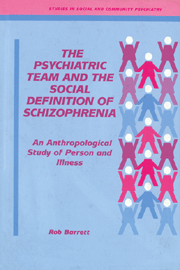 The Psychiatric Team and the Social Definition of Schizophrenia
The Psychiatric Team and the Social Definition of Schizophrenia Book contents
- Frontmatter
- Dedication
- Contents
- Foreword
- Preface
- Acknowledgements
- 1 Schizophrenia in Context
- 2 Time and Space in a Progressive Psychiatric Hospital
- 3 Professional Domains and the Dimensions of a Case
- 4 Clinical Teams and the ‘Whole Person’
- 5 Documenting a Case: The Written Construction of Schizophrenia
- 6 Moral Trajectories: From Acute Psychosis to ‘Chronic Schizophrenic’
- 7 Historical Formulations of Schizophrenia: Degeneration and Disintegration
- 8 Contemporary Formulations of Schizophrenia: Explaining the Inexplicable
- 9 Schizophrenia for Practical Purposes
- 10 The Person, the Case, and Schizophrenia
- References
- Index
2 - Time and Space in a Progressive Psychiatric Hospital
Published online by Cambridge University Press: 05 August 2016
- Frontmatter
- Dedication
- Contents
- Foreword
- Preface
- Acknowledgements
- 1 Schizophrenia in Context
- 2 Time and Space in a Progressive Psychiatric Hospital
- 3 Professional Domains and the Dimensions of a Case
- 4 Clinical Teams and the ‘Whole Person’
- 5 Documenting a Case: The Written Construction of Schizophrenia
- 6 Moral Trajectories: From Acute Psychosis to ‘Chronic Schizophrenic’
- 7 Historical Formulations of Schizophrenia: Degeneration and Disintegration
- 8 Contemporary Formulations of Schizophrenia: Explaining the Inexplicable
- 9 Schizophrenia for Practical Purposes
- 10 The Person, the Case, and Schizophrenia
- References
- Index
Summary
Ridgehaven Hospital was located in a marginal zone on the edge of a major Australian city.1 It had been built during the late 1920s on farming land at a distance of seven miles from the city centre. Surrounded by paddocks, it was intended that patients would engage in healthy outdoor work as part of their rehabilitation. At the same time it was accessible to visitors because it was located at the end of a metropolitan tram line.
When this study was carried out during the early 1980s, Ridgehaven Hospital had maintained its quasi-rural disposition. Although the suburbs with their network of bus routes had extended many miles past the hospital over the intervening fifty years, surrounding tracts of open farm land had been preserved as an agricultural research station, separating the hospital from the nearest housing estates. Two other institutions, a training centre for the intellectually retarded and a prison with its farm, were situated adjacent to the hospital. Slightly farther away were the city abattoirs. Four marginal categories—the mentally ill, the intellectually retarded, the criminal, and the slaughtered beast—thus shared a borderline space between city and country.
Progress
During the 1980s Ridgehaven Hospital was regarded as one of the most progressive psychiatric hospitals in Australia, and the idea of progress itself had become fundamental to the way the hospital defined itself. Its motto, Ex Tenebris in Lucent, captured the sense of movement from old to modern, from ignorance to knowledge, from evil to good.2 Expressions of progress pervaded the brochures, biennial reports, and press releases through which the hospital projected its public image. These publications emphasized the advanced management practices of Ridgehaven and the modern treatments it made available to patients. Addressing the staff on the theme of organizational change, the Medical Director/Chief Executive Officer asserted: ‘The only constant factor is change itself’. In this atmosphere of ongoing improvement, he sought to instil an ethos of ‘striving for excellence’. Ridgehaven became the first public psychiatric hospital in Australia to be officially accredited by the Australian Council of Hospital Standards.
Of the public psychiatric hospitals within the state, it was Ridgehaven that set the pace for deinstitutionalization, the chief index of progress for such institutions.
- Type
- Chapter
- Information
- The Psychiatric Team and the Social Definition of SchizophreniaAn Anthropological Study of Person and Illness, pp. 22 - 37Publisher: Cambridge University PressPrint publication year: 1996
- 1
- Cited by
